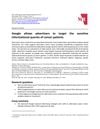 53 citations,
April 2018 in “Journal of The American Academy of Dermatology”
53 citations,
April 2018 in “Journal of The American Academy of Dermatology” Cancer treatments often cause hair disorders, significantly affecting patients' quality of life, and better management methods are needed.
 38 citations,
December 2009 in “Therapeutic Advances in Medical Oncology”
38 citations,
December 2009 in “Therapeutic Advances in Medical Oncology” The conclusion suggests that prostate cancer should be classified by castration status and that new therapies targeting androgen receptor signaling show promise.
 35 citations,
January 2012 in “The Journal of Sexual Medicine”
35 citations,
January 2012 in “The Journal of Sexual Medicine” Androgen Deprivation Therapy for prostate cancer often reduces sexual function but intermittent therapy may be more tolerable.
[object Object]  23 citations,
January 2014 in “International Journal of Biological Sciences”
23 citations,
January 2014 in “International Journal of Biological Sciences” African American men with prostate cancer have more androgen receptor mutations, which may lead to more aggressive cancer compared to Caucasian American men.
 6 citations,
February 2013 in “Medical Oncology”
6 citations,
February 2013 in “Medical Oncology” Certain genetic variants increase the risk of resistance to hormone therapy in prostate cancer patients.
 4 citations,
November 2017 in “Cancer Causes & Control”
4 citations,
November 2017 in “Cancer Causes & Control” Men who start balding at age 20 may have a higher chance of getting aggressive prostate cancer.
 2 citations,
October 2018 in “Springer eBooks”
2 citations,
October 2018 in “Springer eBooks” Cancer treatments can cause skin-related side effects that may affect patient quality of life and require changes in treatment.
 March 2024 in “Frontiers in genetics”
March 2024 in “Frontiers in genetics” Different types of fibroblasts play specific roles in wound healing and cancer, which could help improve treatments.
 January 2023 in “Mastology”
January 2023 in “Mastology” Hormone therapy for breast cancer often leads to sexual issues like vaginal dryness and decreased libido.
 438 citations,
October 2010 in “Oncogene”
438 citations,
October 2010 in “Oncogene” Keratins help protect cells, aid in cancer diagnosis, and influence cancer behavior and treatment.
 403 citations,
December 2018 in “Cell stem cell”
403 citations,
December 2018 in “Cell stem cell” Understanding phenotypic plasticity is crucial for developing effective cancer therapies.
 61 citations,
April 2009 in “British journal of dermatology/British journal of dermatology, Supplement”
61 citations,
April 2009 in “British journal of dermatology/British journal of dermatology, Supplement” Docetaxel and paclitaxel for breast cancer can cause permanent, severe hair loss.
 57 citations,
February 2007 in “International Journal of Cancer”
57 citations,
February 2007 in “International Journal of Cancer” A49T gene variant linked to higher prostate cancer risk, lower hormone levels, and slightly reduced balding risk.
 50 citations,
June 1999 in “Annals of Oncology”
50 citations,
June 1999 in “Annals of Oncology” Giving docetaxel weekly at 40 mg/m² is manageable and has low toxicity for cancer patients.
 48 citations,
September 2013 in “Oncologist”
48 citations,
September 2013 in “Oncologist” Endocrine therapies for cancer significantly increase the risk of hair loss.
 6 citations,
January 2020 in “International Journal of Biological Sciences”
6 citations,
January 2020 in “International Journal of Biological Sciences” Septin4 helps kill colon cancer cells by working with the protein BAX.

Google should ban ads targeting cancer patients with sensitive health-related keywords to protect them from misleading information.
 November 2022 in “CARDIOMETRY”
November 2022 in “CARDIOMETRY” A group has developed therapies that show promise for treating cancer and various other conditions.
 February 2022 in “Research Square (Research Square)”
February 2022 in “Research Square (Research Square)” High TSPEAR levels in colorectal cancer predict worse outcomes.
 January 2022 in “Research Square (Research Square)”
January 2022 in “Research Square (Research Square)” High TSPEAR levels in colorectal cancer predict worse outcomes.
[object Object]  108 citations,
February 2008 in “The Journal of urology/The journal of urology”
108 citations,
February 2008 in “The Journal of urology/The journal of urology” Inhibiting 5α-reductase can help reduce prostate cancer risk and improve treatment.
 50 citations,
January 2016 in “The FEBS journal”
50 citations,
January 2016 in “The FEBS journal” RANK is a key target in breast cancer treatment due to its role in tumor growth and bone metastasis.
 29 citations,
July 2009 in “BJU international”
29 citations,
July 2009 in “BJU international” Blocking DHT production more strongly may help control advanced prostate cancer and improve quality of life.
 21 citations,
March 2019 in “Critical Reviews in Clinical Laboratory Sciences”
21 citations,
March 2019 in “Critical Reviews in Clinical Laboratory Sciences” The androgen receptor is a promising target for breast cancer treatment, especially in triple-negative cases, but more research is needed for personalized therapies.
 April 2012 in “The Journal of Urology”
April 2012 in “The Journal of Urology” More prostate biopsies increase the chance of finding cancers that may not need treatment.
 21 citations,
August 2003 in “Seminars in oncology nursing”
21 citations,
August 2003 in “Seminars in oncology nursing” Nurses are crucial in managing chemotherapy side effects for ovarian cancer patients to improve their quality of life.
 5 citations,
August 2019 in “iScience”
5 citations,
August 2019 in “iScience” Deleting the Trf1 protein in mice is safe and may help prevent cancer without major side effects.
 4 citations,
May 2019 in “Journal of Clinical Oncology”
4 citations,
May 2019 in “Journal of Clinical Oncology” Some breast cancer treatments cause hair loss similar to male pattern baldness, which can be improved with minoxidil.
2 citations,
December 2013 in “Cancer research” Enobosarm may effectively treat androgen receptor-positive breast cancer with fewer side effects.
 88 citations,
February 2008 in “Journal of Medicinal Chemistry”
88 citations,
February 2008 in “Journal of Medicinal Chemistry” Scientists made the first metal-based compounds from a nonsteroidal antiandrogen drug, which showed potential in fighting both hormone-dependent and independent prostate cancer cells.





























